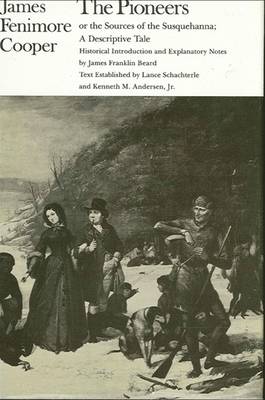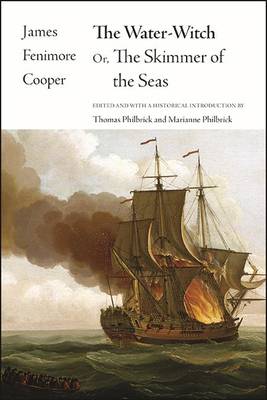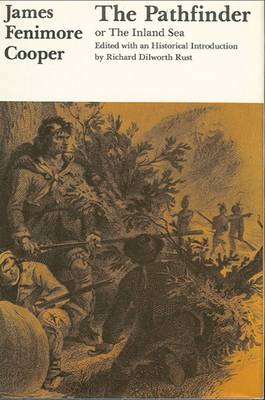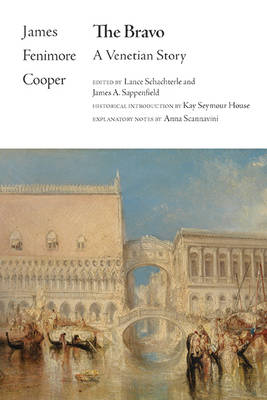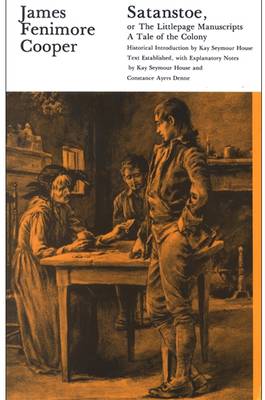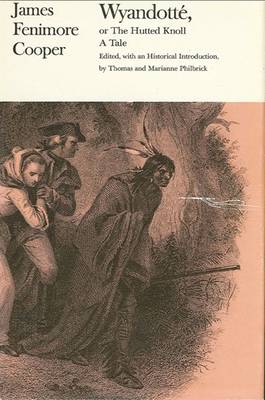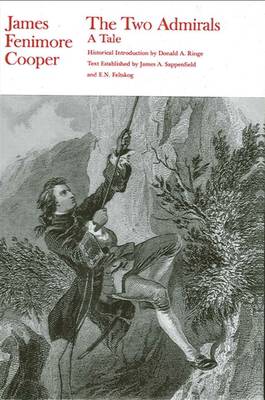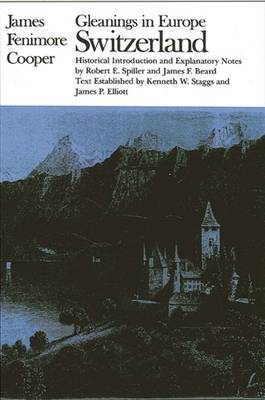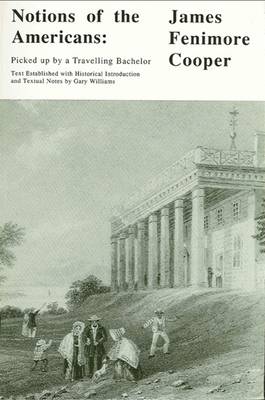
- Retrait gratuit dans votre magasin Club
- 7.000.000 titres dans notre catalogue
- Payer en toute sécurité
- Toujours un magasin près de chez vous
- Retrait gratuit dans votre magasin Club
- 7.000.0000 titres dans notre catalogue
- Payer en toute sécurité
- Toujours un magasin près de chez vous
-
Lionel Lincoln: Or, the Leaguer of Boston
James Fenimore Cooper
- Livre relié | Anglais | Writings of James Fenimore Cooper
- Written to commemorate the fiftieth anniversary of the beginnings of the American Revolution, Lionel Lincoln was a radically new experiment in histori... Savoir plus
151,45 €Livraison 1 à 4 semaines151,45 €Livraison 1 à 4 semaines -
The Prairie
James Fenimore Cooper
- Livre broché | Anglais | Writings of James Fenimore Cooper
- In the spring of 1826, soon after the publication of The Last of the Mohicans, James Fenimore Cooper immersed himself in The Prairie. In taking Natty ... Savoir plus
64,45 €Livraison 2 à 3 semaines64,45 €Livraison 2 à 3 semaines -
The Sea Lions
James Fenimore Cooper
- Livre relié | Anglais | Writings of James Fenimore Cooper
- The Sea Lions (1849) is the twelfth and last of Cooper's sea novels, a genre he largely invented. Drawing upon memories from nearly three decades earl... Savoir plus
100,95 €Pré-commander, date de disponibilité inconnue100,95 €Pré-commander, date de disponibilité inconnue -
The Pioneers or the Sources of the Susquehanna
James Fenimore Cooper
- Livre broché | Anglais | Writings of James Fenimore Cooper
- Written in 1821-22 at a crucial point in Cooper's life and based on some of his most cherished youthful memories, The Pioneers today evokes the Americ... Savoir plus
61,45 €Livraison 2 à 3 semaines61,45 €Livraison 2 à 3 semaines -
The Water-Witch
James Fenimore Cooper
- Livre broché | Anglais | Writings of James Fenimore Cooper
- An exciting tale of nautical adventure on the waters of colonial New York Harbor. Chiefly set on the waters and islands of New York Harbor in the earl... Savoir plus
65,95 €Livraison 2 à 3 semaines65,95 €Livraison 2 à 3 semaines -
The Two Admirals
James Fenimore Cooper
- Livre relié | Anglais | Writings of James Fenimore Cooper
- Author of the first scholarly history of the United States Navy, James Fenimore Cooper had long hoped to commemorate the American Navy by representing... Savoir plus
151,45 €Livraison 1 à 4 semaines151,45 €Livraison 1 à 4 semaines -
The Pathfinder
James Fenimore Cooper
- Livre broché | Anglais | Writings of James Fenimore Cooper
- With the publication of The Pathfinder in 1840, James Fenimore Cooper engaged in what he called the "hazardous experiment" of reviving one of his most... Savoir plus
60,95 €Livraison 1 à 4 semaines60,95 €Livraison 1 à 4 semaines -
Gleanings in Europe
James Fenimore Cooper
- Livre relié | Anglais | Writings of James Fenimore Cooper
- Gleanings in Europe: The Rhine is an account of James Fenimore Cooper's travels in Europe at the time of the 1832 revolt in Paris, when he hoped Gener... Savoir plus
151,45 €Livraison 1 à 4 semaines151,45 €Livraison 1 à 4 semaines -
Wyandotte, or the Hutted Knoll
James Fenimore Cooper
- Livre relié | Anglais | Writings of James Fenimore Cooper
- "One of the misfortunes of a nation, is to hear little besides its own praises," wrote James Fenimore Cooper in his Preface to Wyandotté in 1843. The ... Savoir plus
151,45 €Livraison 1 à 4 semaines151,45 €Livraison 1 à 4 semaines -
The Wing-And-Wing, or Le Feu-Follet
James Fenimore Cooper
- Livre relié | Anglais | Writings of James Fenimore Cooper
- In 1842, James Fenimore Cooper returned to transatlantic themes with a thrilling historical novel set in the Mediterranean Sea, weaving together a cha... Savoir plus
151,45 €Livraison 1 à 4 semaines151,45 €Livraison 1 à 4 semaines -
The Bravo
James Fenimore Cooper
- Livre relié | Anglais | Writings of James Fenimore Cooper
- A novel of early eighteenth-century Venice that Cooper called "in spirit, the most American book I ever wrote." The Bravo (1831) takes place in early ... Savoir plus
100,95 €Pré-commander, date de disponibilité inconnue100,95 €Pré-commander, date de disponibilité inconnue -
Gleanings in Europe
James Fenimore Cooper
- Livre broché | Anglais | Writings of James Fenimore Cooper
- A contemporaneous reviewer called James Fenimore Cooper's England "unquestionably the most searching and thoughtful, not TO say philosophical of any" ... Savoir plus
56,45 €Livraison 1 à 4 semaines56,45 €Livraison 1 à 4 semaines -
Gleanings in Europe
James Fenimore Cooper
- Livre relié | Anglais | Writings of James Fenimore Cooper
- A contemporaneous reviewer called James Fenimore Cooper's England "unquestionably the most searching and thoughtful, not TO say philosophical of any" ... Savoir plus
151,45 €Livraison 1 à 4 semaines151,45 €Livraison 1 à 4 semaines -
B'Nai B'Rith and the Challenge of Ethnic Leadership
Deborah Dash Moore
- Livre relié | Anglais | Writings of James Fenimore Cooper
- B'nai B'rith has a history almost as diverse as the story of American Jewry itself. The oldest secular Jewish organization in the United States, it wa... Savoir plus
151,45 €Livraison 1 à 4 semaines151,45 €Livraison 1 à 4 semaines -
The Pilot
James Fenimore Cooper
- Livre relié | Anglais | Writings of James Fenimore Cooper
- Having drawn on local knowledge and private information for The Spy and on his own boyhood experiences for The Pioneers, it was inevitable that Cooper... Savoir plus
145,45 €Livraison 1 à 4 semaines145,45 €Livraison 1 à 4 semaines -
Gleanings in Europe
James Fenimore Cooper
- Livre broché | Anglais | Writings of James Fenimore Cooper
- Gleanings in Europe: The Rhine is an account of James Fenimore Cooper's travels in Europe at the time of the 1832 revolt in Paris, when he hoped Gener... Savoir plus
56,45 €Livraison 1 à 4 semaines56,45 €Livraison 1 à 4 semaines -
The Pilot
James Fenimore Cooper
- Livre broché | Anglais | Writings of James Fenimore Cooper
- Having drawn on local knowledge and private information for The Spy and on his own boyhood experiences for The Pioneers, it was inevitable that Cooper... Savoir plus
60,95 €Livraison 1 à 4 semaines60,95 €Livraison 1 à 4 semaines -
Satanstoe, or the Littlepage Manuscripts
James Fenimore Cooper
- Livre broché | Anglais | Writings of James Fenimore Cooper
- Though Satanstoe has been too much neglected by readers of Cooper's time and ours, it is one of his most interesting books, combining nostalgic autobi... Savoir plus
64,45 €Livraison 2 à 3 semaines64,45 €Livraison 2 à 3 semaines -
Gleanings in Europe
James Fenimore Cooper
- Livre broché | Anglais | Writings of James Fenimore Cooper
- France (1837) was the third volume published in Cooper's Gleanings in Europe series, but first in the chronology of his European experience. Less sequ... Savoir plus
56,45 €Livraison 1 à 4 semaines56,45 €Livraison 1 à 4 semaines -
Wyandotte, or the Hutted Knoll
James Fenimore Cooper
- Livre broché | Anglais | Writings of James Fenimore Cooper
- "One of the misfortunes of a nation, is to hear little besides its own praises," wrote James Fenimore Cooper in his Preface to Wyandotté in 1843. The ... Savoir plus
57,95 €Livraison 1 à 4 semaines57,95 €Livraison 1 à 4 semaines -
The Two Admirals
James Fenimore Cooper
- Livre broché | Anglais | Writings of James Fenimore Cooper
- Author of the first scholarly history of the United States Navy, James Fenimore Cooper had long hoped to commemorate the American Navy by representing... Savoir plus
60,95 €Livraison 1 à 4 semaines60,95 €Livraison 1 à 4 semaines -
Gleanings in Europe
James Fenimore Cooper
- Livre broché | Anglais | Writings of James Fenimore Cooper
- In the summer of 1828 James Fenimore Cooper, his wife, and their five children set out from Paris for Switzerland, and Cooper wrote that he experience... Savoir plus
56,45 €Livraison 1 à 4 semaines56,45 €Livraison 1 à 4 semaines -
The Red Rover
James Fenimore Cooper
- Livre relié | Anglais | Writings of James Fenimore Cooper
- Turning to his own extensive maritime experience, Cooper's novel, written in Paris in 1827, reflects his immersion in the romantic movement that was s... Savoir plus
151,45 €Livraison 1 à 4 semaines151,45 €Livraison 1 à 4 semaines -
Notions of the Americans
James Fenimore Cooper
- Livre broché | Anglais | Writings of James Fenimore Cooper
- Notions of the Americans in considered Cooper's first work of non-fiction despite a thin overlay of character and plot. Written in the form of a trave... Savoir plus
73,45 €Livraison 1 à 4 semaines73,45 €Livraison 1 à 4 semaines








